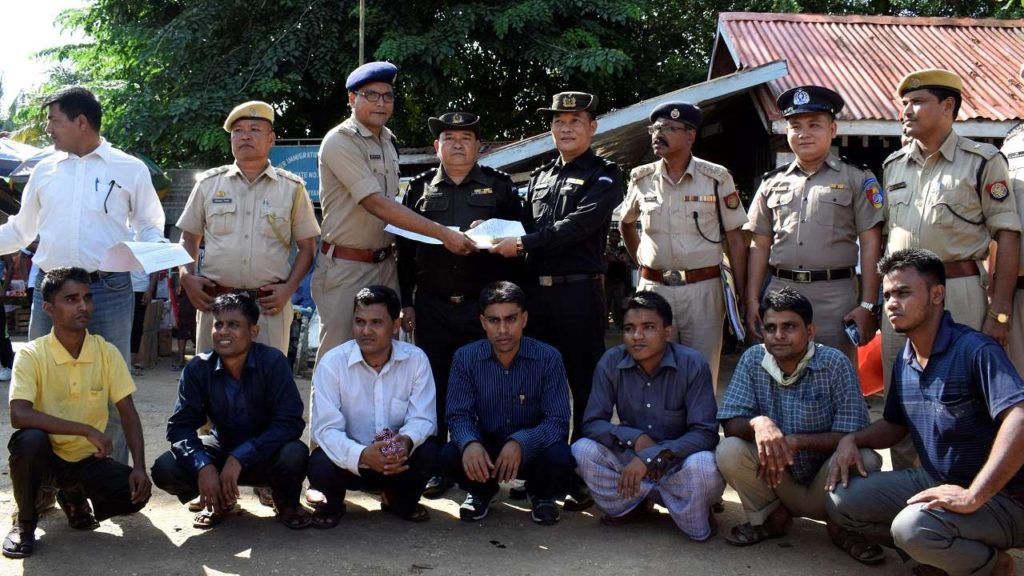Hours after Indian TV channels flashed that the country was deporting seven Rohingya Muslims to Burma (Myanmar), Sahidullah said he received a call from his nephew: “Uncle, please get us out of here. They will send us back too.”
Sahidullah, a Rohingya living in the far north of India after fleeing what he called persecution in Buddhist-majority Myanmar in 2010, said his relative, Sadiur Rahman, 40, was lodged in one of several detention centers for illegal immigrants in the distant northeastern state of Assam.

Rahman, he said, had been incarcerated with his brother and eight other relatives since being caught in 2012 at a railway station as they fled to India via Bangladesh. Sahidullah had taken the same route two years earlier, but like many others had escaped detection.
He said Rahman made the phone call when he was taken out for a routine medical checkup on Oct. 3, the day when India moved the seven Rohingya men out of a similar detention center and took them to the border.
They were handed to the Myanmar authorities the next day, the first ever such deportations of Rohingya here, spreading panic among an estimated 40,000 refugees who have fled to India from its neighbor.
About 16,500 of the refugees, including Sahidullah, have been issued identity cards by the United Nations High Commissioner for Refugees (UNHCR) that it says helps them “prevent harassment, arbitrary arrests, detention and deportation”.
India says it does not recognize the cards and has rejected the UN’s stand that deporting the Rohingya violates the principle of refoulement – sending back refugees to a place where they face danger.
“Anyone who has entered the country without a valid legal permit is considered illegal,” said A. Bharat Bhushan Babu, a spokesman for the Ministry of Home Affairs. “As per the law, anyone illegal will have to be sent back. As per law they will be repatriated.”
In recent days, Reuters interviewed dozens of Rohingya in two settlements, one in the northern city of Jammu and a smaller one in the capital, Delhi, and found communities who feel they are being increasingly vilified.
Many now fear Prime Minister Narendra Modi’s Hindu nationalist government is about to act on its stated position – that it wants to deport all Rohingya Muslims from the country. With a general election due by next May, they worry that targeting them will be a populist tactic used by Modi and his ruling Bharatiya Janata Party (BJP).
Addressing an election rally in the central state of Madhya Pradesh on Saturday, BJP chief Amit Shah said that all illegal immigrants were “like termites eating into the nation’s security”.
Read more for the source: REUTERS
More Stories
India’s Crackdown on Muslims and Rohingya Refugee
In recent months, Indian authorities have dramatically escalated their campaign to identify and expel so-called “illegal immigrants” within the country’s...
Arakan Army Allegedly Shoots, Abducts on Naf River
Teknaf, Cox’s Bazar – The Arakan Army (AA), an armed rebel group in Myanmar, has been accused of shooting two...
India Forcibly Deports Rohingya Refugee to Myanmar
New Delhi, India – Indian authorities have arrested, detained, and forcibly deported at least 40 Rohingya refugees, including women and...
Dozens of Rohingya Refugees Detained in Delhi
Arakan Now - 7 May 2025 Dozens of Rohingya refugees, including those with United Nations High Commissioner for Refugees (UNHCR)...
Rohingya Who Entered India Were Arrested
In a distressing development, the Anti-Terrorism Squad (ATS) of Uttar Pradesh, India, has unlawfully apprehended four Rohingya individuals, including three...
Over a Dozen of Rohingya Refugees Detained in Jammu-Kashmir On Allegation of Holding Fake UNHCR Documents
Over a dozen Rohingya refugees in Jammu-Kashmir were reportedly detained by the Indian police on the allegation of holding fake...